…is now available! Click here.

…is now available! Click here.

Hey everyone, we’re raising awareness about mental health this month and today we’re exploring how empathy is different than sympathy.
Check out this explanation (from Brené Brown).
Hey everyone, we’re raising awareness about mental health this month. CMHA has featured empathy in their mental health week campaign this year – and empathy is very important in communication and in relationships!
However, and as CMHA highlights here in “Empathy and Compassion Fatigue” by Allison Dunning (Peer Support Canada), it’s important to know about and be aware of the “downfall” of empathy: compassion fatigue.
Compassion fatigue happens when we spend so much of our human energy trying to listen, understand and support others that we become exhausted ourselves. We can spend so much time thinking about other peoples’ experiences, needs and well-being, that we can forget to think about our own.
“Empathy and Compassion Fatigue” by Allison Dunning (Peer Support Canada)
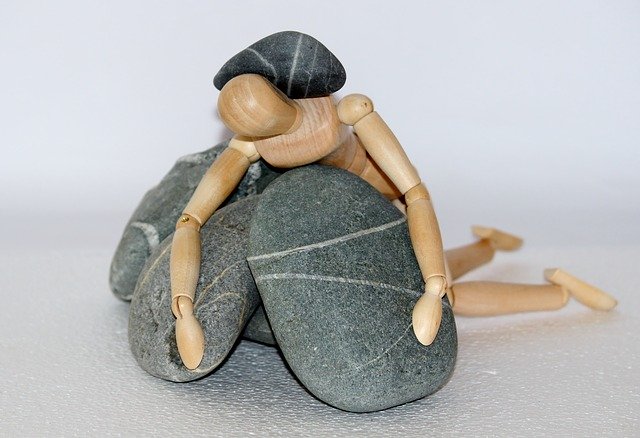
Self-care and guarding against compassion fatigue are important parts of being in a caring profession. There are many resources available online as well as lots of posts on our website with information, resources, and strategies to help with compassion fatigue.
You can also check out suggestions to guard against compassion fatigue while still engaging in empathy in the original article on the CMHA website here, or their further suggested reading on strategies here.
Hey everyone, as part of Emergency Preparedness Week we want to share some helpful resources to support everyone to build their emergency kit.
Check out this video that walks through the process of putting together a kit — and some special considerations, like medications and mobility.
Check out the lists on this page to make your own kit, or start off with a guide like this one. You can also find information online about where to get a kit. There’s also a great resource here about preparing a kit on a budget.
Don’t forget to consider having an emergency car kit if you drive or own a vehicle! You can check out information on emergency car kits here.
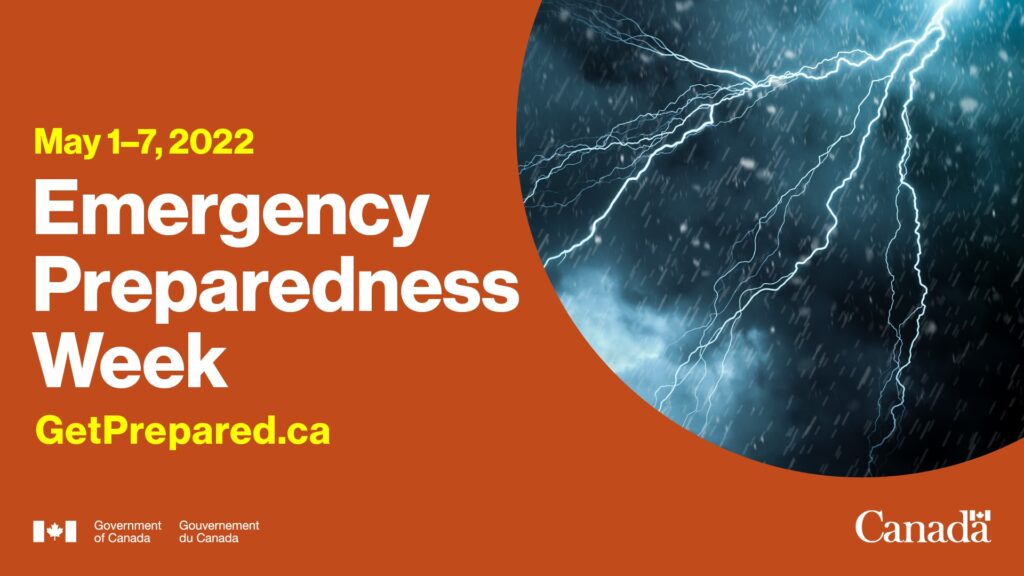
Hey everyone, we posted about CMHA Mental Health week and the focus on empathy in this year’s campaign — but what exactly does “empathy” mean, and how can we “tune in” better? Check out the answer here!
Hey everyone, we’ve been posting emergency planning information and resources for Emergency Preparedness Week, and we want to take time to talk stress.
Emergencies can be stressful to think about. Planning for emergencies might seem like a big chore, or it might seem like it’s an impossible job to be ready for anything, or it might make you feel scared or sad.
It’s important to know that having a plan is one of the best emergency response strategies you can have: it will help you stay calm if you’re ever faced with a real emergency. So, while emergency planning might seem like a challenge, it’s definitely worthwhile!
Here’s some videos to help lighten things up and simplify some key concepts (and a website to got with them!).
GRAB AND GO BAG:
EMERGENCY KIT:
GRAB AND GO BAG vs. EMERGENCY KIT (What’s the difference?)
Hey everyone, as part of Emergency Preparedness Week we want to focus in on supporting everyone to make an emergency plan that keeps you ready for anything!
Check out this video for a helpful walk-through of what to consider and what to do in case of some examples like 1) flooding while you’re not home, 2) a severe storm while you’re are home, and 3) a wildfire evacuation order.
Check out this page for access to 9 free online emergency preparedness guides you can use to plan for an emergency specific to your needs — from pets, to power outages, to pocket guides.
Finally, check out this page for some tips on how you can (and can’t) use technology when you’re planning what to do in case of an emergency, like these helpful hints:
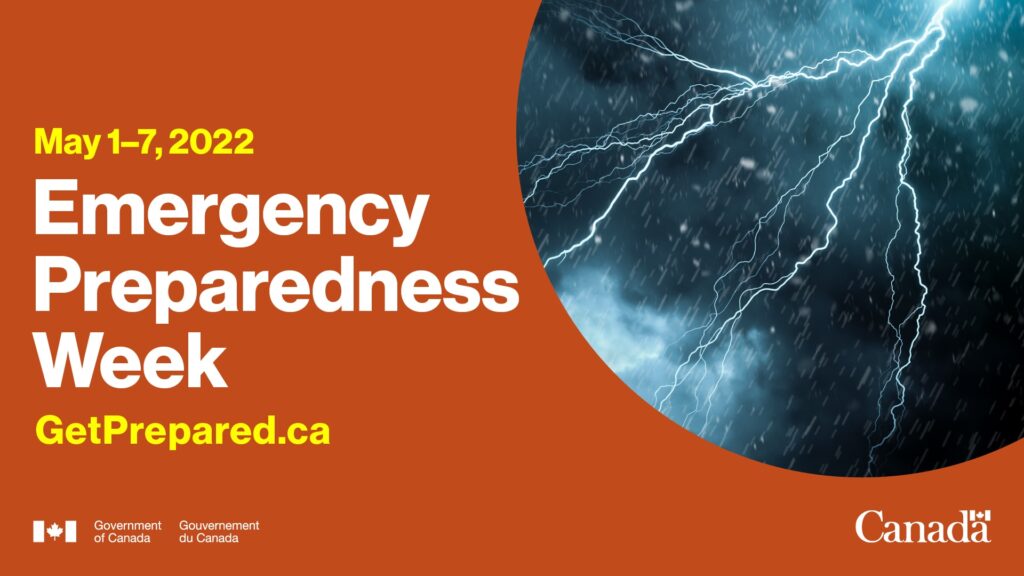
Hey everyone, this interactive webinar about emergency preparedness is taking place TONIGHT – register below!
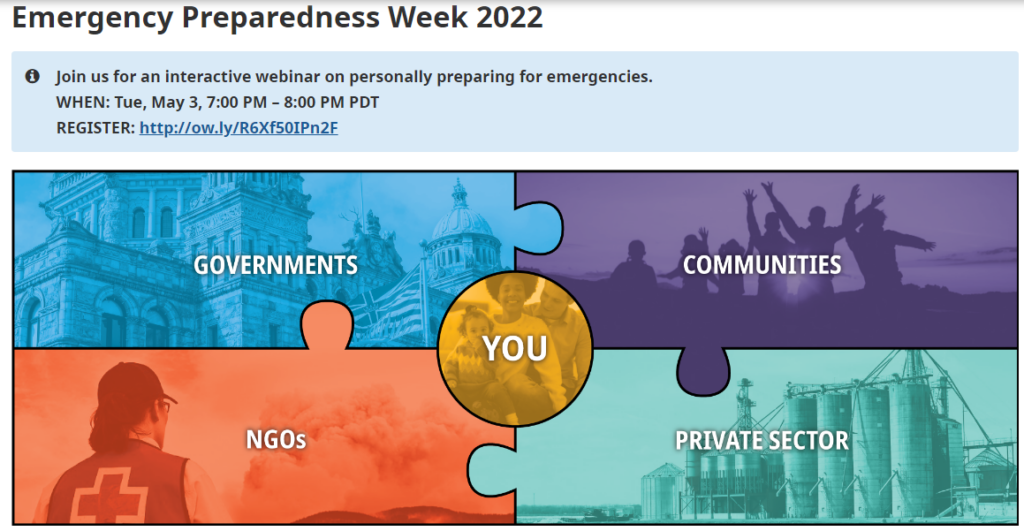
Hey everyone, we’re taking some time during our emergency preparedness week to talk about mental health.
It’s the Canadian Mental Health Association’s annual Mental Health Week this week — and here are some key strategies you can put to use right away!
Start here with The Power of Empathy.

Hey everyone, it’s Emergency Preparedness Week and we’re posting some great resources to help you stay prepared for emergencies!
This year’s campaign is all about being ready for anything — and you can share how you’re preparing (and help others in the process!) by participating in the Government of Canada social media campaign in support of Emergency Preparedness Week! Get creative, have fun, and get ready for anything:
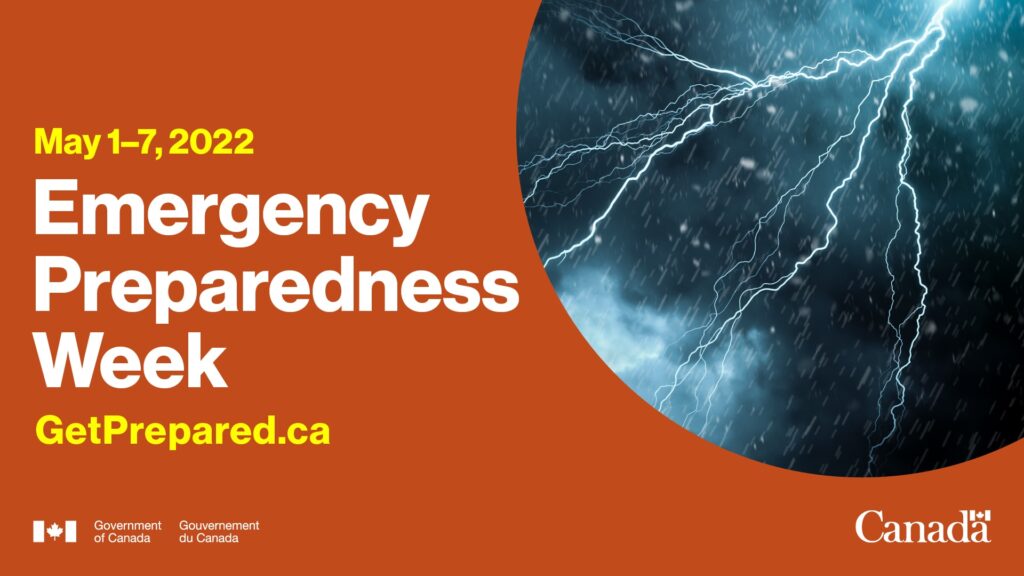
Participate in our tag challenge or enter to win an emergency kit.
Be a positive influence within your networks by participating in our tag challenge. Show us your best emergency preparedness tip in a video or photo, and tag 3 or your friends or family and ask them to share their tip.
You can also win an emergency preparedness kit. Simply tell us how how you’re helping to make you and your family better prepared to cope during an emergency, and use the hashtag #ReadyforAnything.
It can be as simple as making an emergency kit with items found around your home, creating a family emergency plan, or becoming more informed about the hazards in your area. Get creative and post those messages, photos, or videos!
Don’t forget to use the hashtags #EPWeek2022 and #ReadyforAnything.
https://www.getprepared.gc.ca/cnt/rsrcs/ep-wk/index-en.aspx